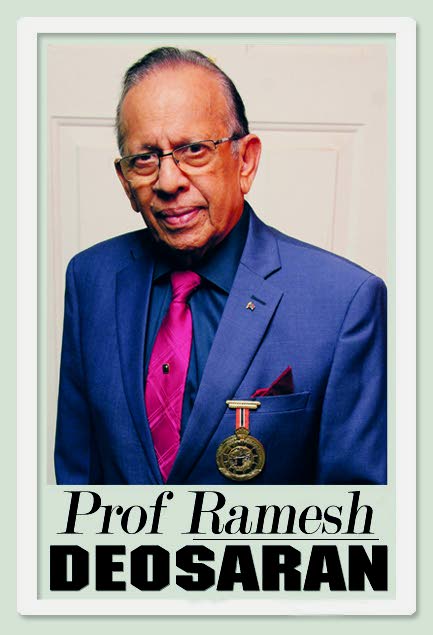Propaganda in politics, crime

Since this country is in a life-and-death war against crime, there is a compelling, inevitable desire for the government forces to win this war.
But given the political system as it is, the Opposition feels obligated to question the government’s methods, promises and apparent “failures.” The need for persuasion and its techniques from both sides therefore makes crime a hot political issue, with each side striving for support.
Propaganda, for good or bad purpose, comes into inevitable play. Propaganda, benefiting from free-speech spaces, simplifies issues and mobilises a crowd with weakened mentality. In fact, some of the most persuasive political speeches have been those with a clever mixture of facts and propaganda – especially when given to a friendly crowd. If you listened to Israeli PM Benjamin Netanyahu’s speech to US Congress last Wednesday, you will see what I mean.
Did Iran really support Trump's 20-year-old shooter? Are the anti-Israel protesters “officially Iran’s useful idiots?”
Two weeks ago, this column stated: “A lot of politics is about showmanship, theatre and propaganda without which there is almost no politics and wherein the crowd creates the hero. Critical thinking merely irritates the flow.”
Last week, Minister of National Security Fitzgerald Hinds sincerely said: “What I am satisfied with is that I gave my mind, my time, my heart and my soul to my work as a minister and I do so very proudly and very confidently…So I do my part and do it thoroughly and I do it wholeheartedly…As a government, we keep a very open mind, very open ears and we listen to the cries of the population.”
Around the same time, the UNC Chaguanas mayor Faaiq Mohammed said: “We have the worst crime rate under this Minister of National Security, yet you continue to have faith in him to make changes. I don’t know who is mad – maybe the Prime Minister is going mad. Change needs to happen now, because this crime rate could lead to a civil uprising.”
Now, as well-meaning as they may be, which statement do you think amounts to propaganda? The first? The second? Both? Or none?
Propaganda is defined as “organised efforts to induce certain attitudes in other people or in public, largely by way of suggestion and the utilisation of emotionally tinged words ”(from the Dictionary of Psychology). Its biased use is largely exercised in wars, politics and advertising. Inaccurate, repeated or exaggerated claims, statistics, images, even lying are some of the key instruments. Usually, propaganda travels without evidence, leaving its power in the eyes of the beholder.
And there is also subliminal seduction. Why is this sexy-looking girl hovering over the advertised bottle of whisky?
Propaganda’s main objective is to reinforce or change an audience or person’s mind and thinking in, for example, seeking support for a particular view, a particular party, a certain product, or even appearing to win a war, etc. A big one was when both US President George W Bush and British PM Tony Blair justified the invasion of Iraq by falsely claiming “weapons of mass destruction” there.
Was former president Donald Trump’s repeated claim he was “cheated” out of the 2020 US elections true?
Uniforms and flags, the swastika symbol, lavish marches, big, repeated lies through censored radio and newspapers all helped make Hitler and the Nazi party looked invincible, for a time.
We here had and continue to have our propaganda share, with the mass media caught in the middle with daily “he say-she say” exchanges. Propaganda may be mischievous or untrue, but not a crime, unless it is seditious or libellous.
During the covid epidemic, much misinformation flowed as propaganda. Who is lying? several commentators asked.
I then wrote a column entitled Lies, lying and liars.
Today, the same question is asked about contradictory reports concerning the Strategic Services Agency (SSA). Who is lying?
Now, lying in politics is an age-old phenomenon. In parliament, it is a serious breach of privilege. Calypsonian Lord Nelson, noting our cultural relish for it, sang about King Liar, a contest between three “big liars” with the moralising chorus: “Teacher Percy say if you tell a lie/You going to hell as soon as you die.”
Not all lying is propaganda. How many people would lie to get medicine in order to save their mother’s life? In her book Lying: Moral Choice in Public Life, Sissela Bok noted several contexts in which “lying for survival” may be justified.
The survival of party politics often depends on lying to “protect the party.”
“White lies” are the trade of diplomacy, tolerated and understood.
Through fake news, post-truth and social-media misinformation, lying has now become an industry in itself. The anonymity adds danger.
Witnesses lie in court every day. Cross-examination doesn’t always help.
Machiavelli allowed propaganda in politics as necessary for maintaining power. Check the newspapers for political statements, especially about crime, which appear as propaganda.

Comments
"Propaganda in politics, crime"